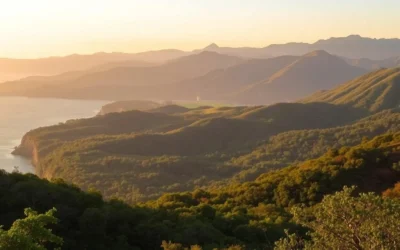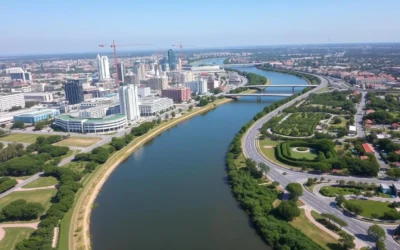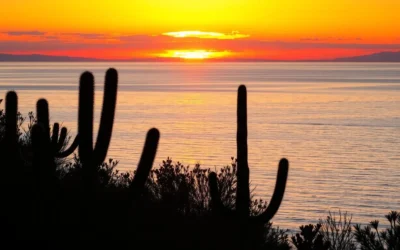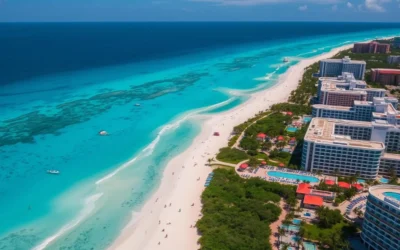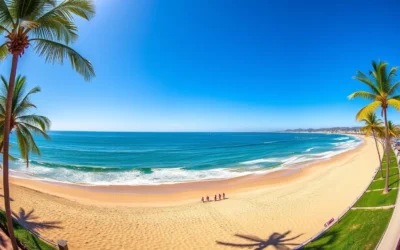Did you know that Volcán Nevado de Colima National Park is home to one of North America’s most active volcanoes? While the dormant Nevado de Colima stands majestically at 4,260 m (13,976 ft), its fiery twin, Volcán de Fuego, has erupted over 40 times since 1576 and continues to belch smoke and ash regularly. This dramatic contrast of fire and ice creates one of Mexico’s most spectacular and underrated natural wonders.
Getting There & Planning Your Journey
Reaching Volcan Nevado de Colima National Park requires some planning, but the journey is well worth the effort. The park straddles the states of Jalisco and Colima in west-central Mexico, with several access points depending on your starting location.
The most common approach is from Ciudad Guzmán, a small city about 120 km (75 miles) south of Guadalajara. From here, you can take a bus to El Fresnito and then arrange transportation to the park entrance. The entrance fee is approximately 45 Mexican pesos (about $2.50 USD).
Ready to Start Your Adventure?
Book your flights to Guadalajara International Airport, the most convenient gateway to Volcan Nevado de Colima National Park.
For those seeking convenience, consider renting a car in Guadalajara or Colima City. The drive to the park takes approximately 2-3 hours, and having your own vehicle provides flexibility to explore at your own pace. A 4×4 vehicle is highly recommended, especially during the rainy season, as the final 20 km (12 miles) to the trailhead at La Joya consists of rough, unpaved roads.
Best Time to Visit & Weather Tips
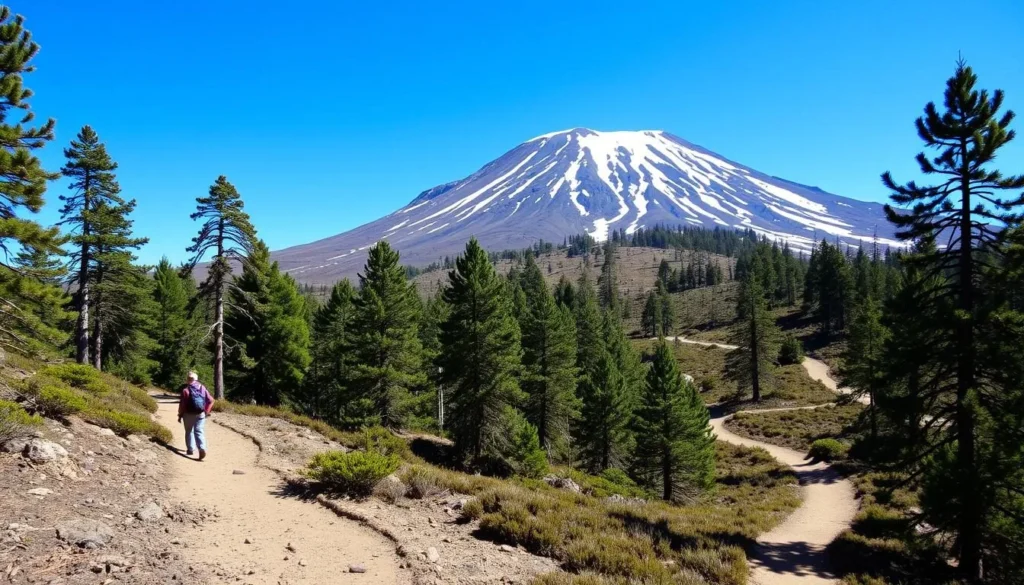
The climate at Volcan Nevado de Colima varies dramatically with elevation. While lower areas remain relatively warm year-round, temperatures at higher elevations can drop below freezing, especially during winter months.
Recommended Months:
- November to May (dry season)
- December to February (coldest, possible snow)
- March to April (moderate temperatures, clear skies)
Months to Avoid:
- June to October (rainy season)
- July to September (heaviest rainfall)
- Stormy days (lightning risk at the summit)
The best months for climbing are generally December through May during the dry season. However, temperatures from December to February often dip below 0°C (32°F), and snow can fall on the upper slopes – that’s why it’s called “nevado” (snow-covered). For the most comfortable hiking conditions with less extreme temperatures, aim for March to April.
Pro Tip: Weather changes rapidly on the mountain. Start your hike early (before 7 AM) to avoid afternoon storms and clouds that frequently obscure the summit. Park hours vary seasonally: November to March (6 AM to 6 PM) and extended hours during summer.
Getting Around Locally
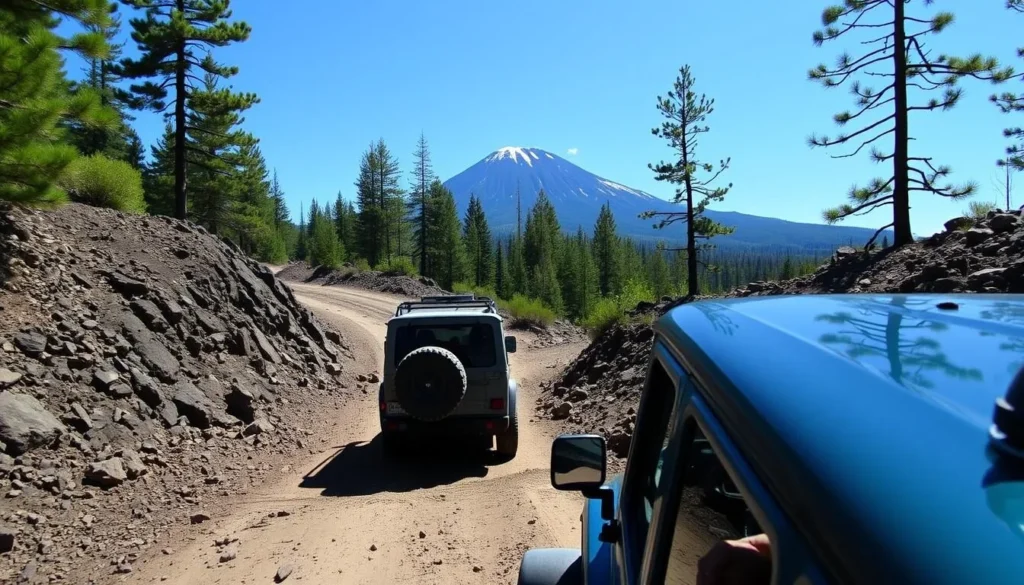
Once you’ve reached the park area, getting around requires either a sturdy vehicle or good hiking boots. The final approach to the main trailhead at La Joya/Puerto Las Cruces (3,500 m/11,500 ft) involves a rough 20 km (12 mile) dirt road that’s challenging without a 4×4 vehicle.
Transportation Options:
- Rental car (4×4 recommended)
- Local guide with vehicle
- Bus to El Fresnito + hired driver
- Hiking (for the adventurous)
Important Distances:
- Ciudad Guzmán to El Fresnito: 10 km (6 miles)
- El Fresnito to La Joya trailhead: 20 km (12 miles)
- La Joya to summit: 9 km (5.6 miles) one-way
- Elevation gain from La Joya: 700 m (2,300 ft)
If you don’t have your own vehicle, you can take a bus from Ciudad Guzmán to El Fresnito (approximately 22 pesos) and then try to hire a local driver to take you up to the trailhead. However, finding a driver in El Fresnito can be challenging without prior arrangements.
Explore at Your Own Pace
Rent a 4×4 vehicle to navigate the challenging roads and explore Volcan Nevado de Colima National Park on your own schedule.
Where to Stay

Accommodation options within Volcan Nevado de Colima National Park are limited to camping, but several nearby towns offer comfortable lodging for those who prefer a proper bed before or after their mountain adventure.
Camping
The most authentic experience is camping at La Joya/Puerto Las Cruces (3,500 m/11,500 ft). This basic campsite has minimal facilities but offers incredible star-gazing and puts you in position for an early summit attempt. Camping fees are approximately 50 pesos per tent. Bring warm sleeping gear as temperatures drop significantly at night.
Ciudad Guzmán
This small city 25 km (15 miles) from the park offers several hotels and guesthouses. It’s an excellent base for your expedition with restaurants, shops for supplies, and transportation connections. Accommodations range from budget hostels to mid-range hotels with prices from $25-75 USD per night.
Colima City
Located about 30 km (19 miles) south of the park, Colima City provides more upscale accommodation options, including boutique hotels and colonial-style inns. The city offers excellent dining and cultural attractions to complement your volcano adventure. Expect to pay $40-100 USD per night.
Find Your Perfect Stay
Book accommodations in Ciudad Guzmán or Colima City for a comfortable base to explore Volcan Nevado de Colima National Park.
Dining & Local Cuisine
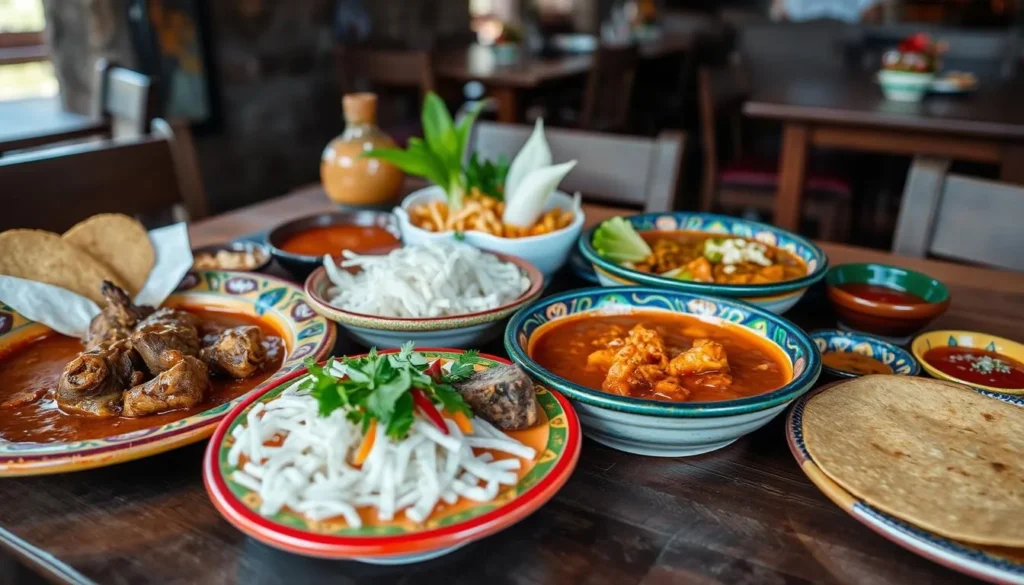
There are no dining facilities within the national park, so visitors should pack all necessary food and water for their excursion. However, the surrounding region offers delicious local cuisine that’s worth exploring before or after your volcano adventure.
Regional Specialties:
- Birria – A savory stew traditionally made from goat meat, marinated in a blend of chiles and spices
- Pozole – A hearty hominy soup often served with shredded cabbage, radishes, and lime
- Raicilla – A traditional agave spirit similar to tequila but with unique flavors specific to the region
- Ponche de Granada – A warm fruit punch made with pomegranates, popular in Colima
Ciudad Guzmán offers several good restaurants serving traditional Jalisco cuisine. Look for small family-run establishments where you can try authentic regional dishes at reasonable prices. In Colima City, you’ll find a wider range of dining options, from traditional Mexican to international cuisine.
Hiking Food Tip: Pack high-energy, lightweight foods for your volcano trek. Local markets in Ciudad Guzmán are perfect for stocking up on fresh fruits, nuts, cheese, and tortillas. Don’t forget to bring at least 2-3 liters of water per person for a summit attempt.
Attractions, Sightseeing & Activities

Summit Hike to Nevado de Colima
The crown jewel of activities in the park is the hike to the summit of Nevado de Colima (4,260 m/13,976 ft). From the La Joya trailhead, it’s approximately a 9 km (5.6 mile) hike with 700 m (2,300 ft) of elevation gain to reach the top. Most hikers need 3-4 hours to reach the summit and about 3 hours to descend. The trail offers spectacular views of the neighboring active volcano, Volcán de Fuego, and on clear days, you can see all the way to the Pacific Ocean.
Safety Note: Altitude sickness is a real concern when ascending rapidly to 4,260 m (13,976 ft). If you feel lightheaded, dizzy, or nauseous, descend immediately. Consider spending a night at La Joya to acclimatize before attempting the summit.
Wildlife Viewing
The park is home to diverse wildlife, including deer, wild boars, coyotes, and even elusive pumas. Birdwatchers will appreciate the variety of species found in the pine-oak forests. Early morning is the best time for wildlife spotting, especially along the quieter forest trails below La Joya.
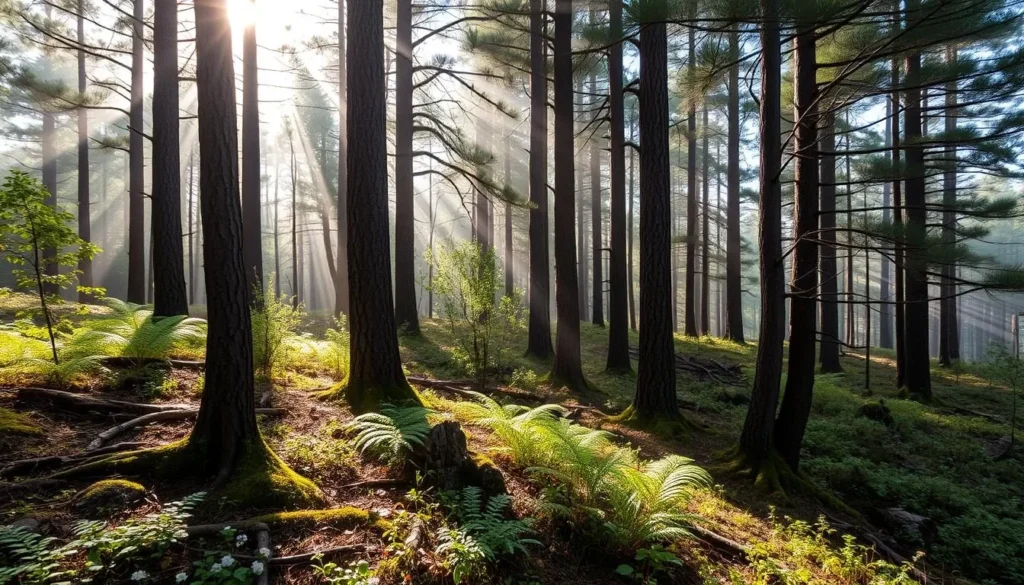
Observing Volcán de Fuego
While climbing the active Volcán de Fuego is prohibited due to dangerous volcanic activity, several viewpoints within the park offer safe observation of this impressive natural wonder. The best views are from the upper slopes of Nevado de Colima, where you can often see smoke and occasional minor eruptions from a safe distance.
Experience the Best of Volcan Nevado de Colima
Book a guided tour with experienced local guides who know the mountain and can enhance your safety and enjoyment.
Cultural Spots & Local Experiences
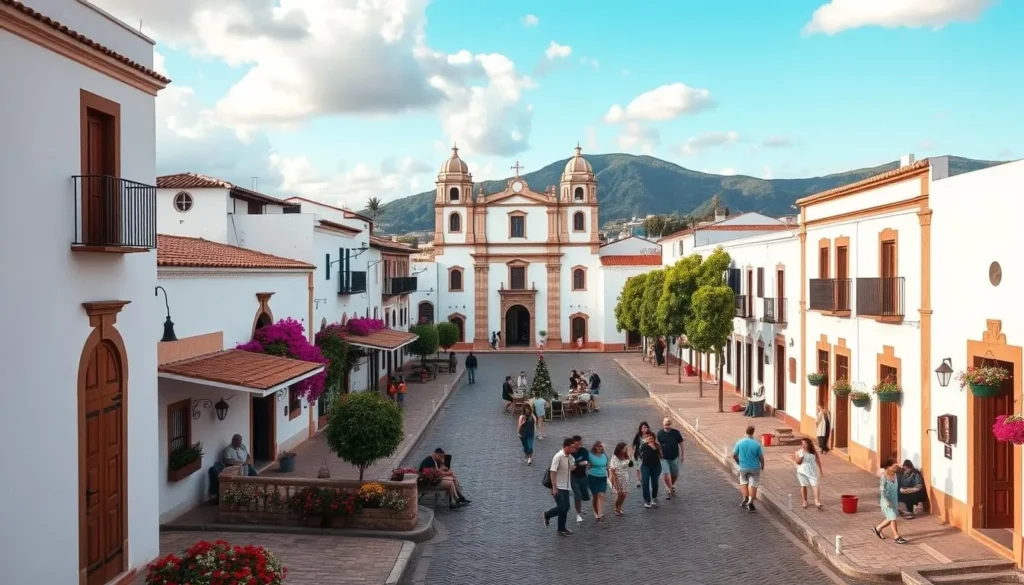
While the national park itself focuses on natural wonders, the surrounding region offers rich cultural experiences that complement your volcano adventure.
Nearby Cultural Attractions:
- Comala – This “Pueblo Mágico” (Magical Town) is famous for its white buildings, traditional restaurants, and the nearby Ex-Hacienda Nogueras, which houses a museum dedicated to Mexican artist Alejandro Rangel Hidalgo.
- Museo Arqueológico de Ciudad Guzmán – A small but informative museum showcasing the archaeological history of southern Jalisco state.
- La Campana Archaeological Site – Ancient pyramid-like structures dating back to 1500 BC, located near Colima City.
- Museo Universitario de Artes Populares – In Colima City, this museum showcases folk art including masks, puppets, and traditional crafts.
Many local communities maintain traditional crafts and customs that have been practiced for generations. In Ciudad Guzmán and surrounding villages, you might encounter local festivals featuring traditional music, dance, and cuisine, especially during religious holidays.
Outdoor Adventures & Activities
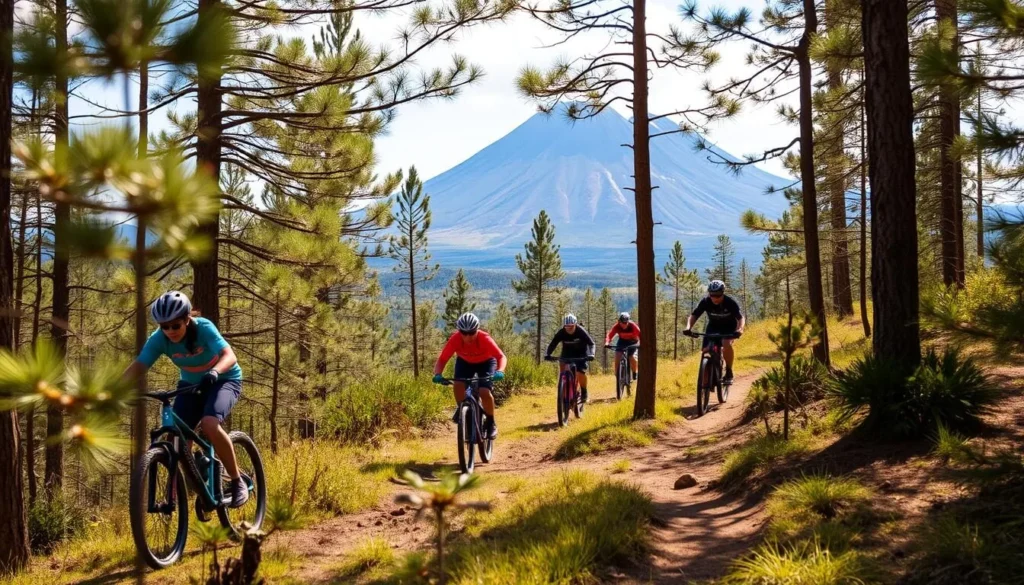
Beyond the signature summit hike, Volcan Nevado de Colima National Park offers numerous outdoor activities for adventure enthusiasts:
Hiking Trails
Several shorter trails explore the pine forests and alpine zones without the commitment of a summit attempt. The trail to the microondas (radio antennae) takes about 90 minutes from La Joya and offers spectacular views with less elevation gain. Forest trails at lower elevations provide more accessible hiking options.
Mountain Biking
The lower elevation forest roads and trails offer excellent mountain biking opportunities. The varied terrain provides challenges for riders of different skill levels, though bikes aren’t permitted on the upper summit trails to protect the fragile alpine environment.
Photography
The dramatic landscapes, from smoking volcanoes to snow-dusted peaks and lush forests, provide endless photography opportunities. Dawn and dusk offer the most dramatic lighting, with the golden hour casting a magical glow on the volcanic peaks.
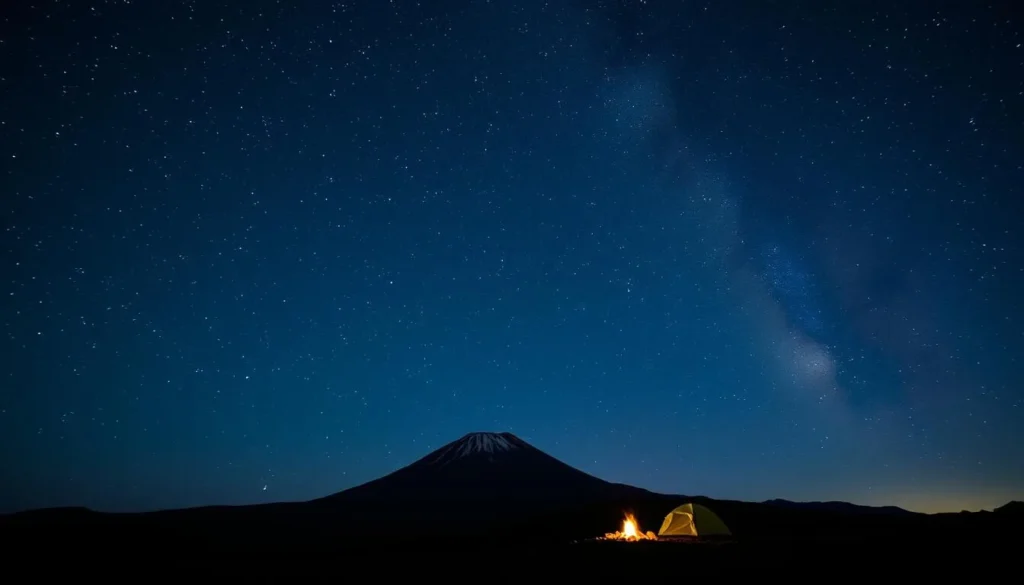
Stargazing
The high elevation and minimal light pollution make Volcan Nevado de Colima an exceptional location for stargazing. On clear nights, the Milky Way stretches dramatically across the sky, and the stars appear remarkably close. Camping at La Joya provides the perfect opportunity to experience this celestial display.
Safety, Etiquette & Local Customs
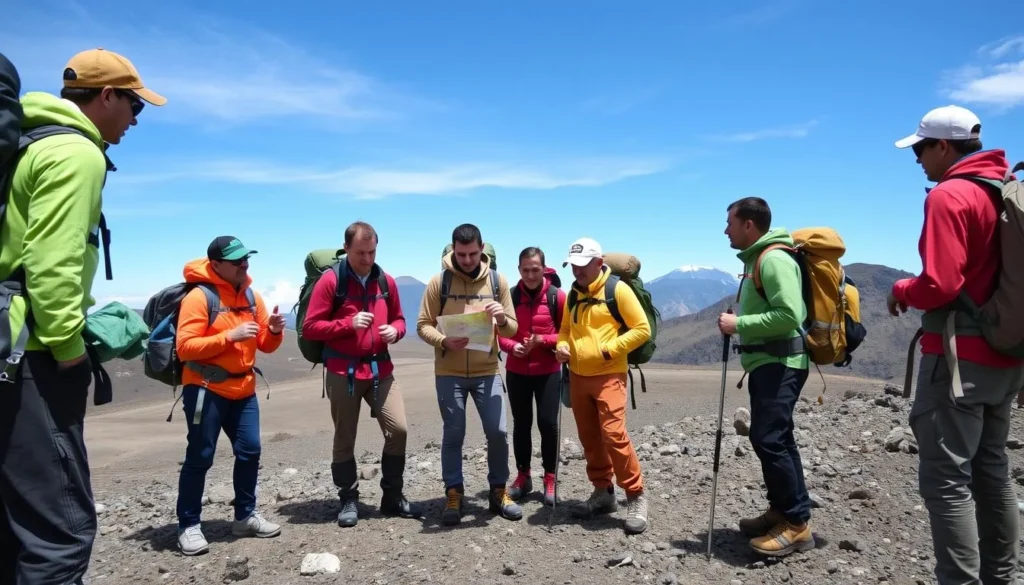
Mountain Safety
Hiking in Volcan Nevado de Colima requires proper preparation and respect for the mountain environment:
- Never hike alone – the trails can be confusing and it’s easy to get lost
- Start early (before 7 AM) to avoid afternoon storms and clouds
- Bring appropriate clothing for rapidly changing weather conditions
- Pack warm layers even in summer – temperatures at the summit can be near freezing
- Carry sufficient water (minimum 2-3 liters per person) and high-energy foods
- Be aware of altitude sickness symptoms and descend immediately if they occur
- Check weather forecasts and avoid hiking during stormy conditions (lightning risk)
Important: The active Volcán de Fuego is dangerous and off-limits to hikers. Observe this impressive volcano only from designated safe viewpoints. Never attempt to approach or climb it.
Environmental Etiquette
Help preserve this beautiful natural area by following Leave No Trace principles:
- Pack out all trash (there are no garbage facilities on the mountain)
- Stay on established trails to prevent erosion and protect fragile alpine vegetation
- Respect wildlife by observing from a distance and never feeding animals
- Use established campsites at La Joya rather than creating new impact areas
- Minimize campfire impacts by using established fire rings and collecting only dead wood
Practical Travel Tips
Essential Packing List:
- Hiking boots with good ankle support
- Layered clothing (temperatures vary dramatically)
- Warm jacket, hat, and gloves (even in summer)
- Rain gear (especially during shoulder seasons)
- Sun protection (hat, sunglasses, sunscreen)
- Headlamp or flashlight with extra batteries
- First aid kit including blister treatment
- Map and compass (don’t rely solely on phone GPS)
- High-energy snacks and sufficient water
- Camera (you’ll want to capture the views!)
Practical Information:
- Currency: Mexican Peso (MXN). Bring cash for park fees and small purchases as credit cards aren’t accepted at the park entrance or in rural areas.
- Language: Spanish is the primary language. While some tourism workers speak English, having basic Spanish phrases is helpful, especially in remote areas.
- Cell Service: Limited or non-existent within the park. Download offline maps and inform someone of your hiking plans.
- Guides: Consider hiring a local guide for the summit hike. They provide safety, navigation, and cultural insights. Arrange guides in advance through hotels in Ciudad Guzmán.
- Permits: Pay the entrance fee at the park gate. No advance reservations are required for day hiking, but camping may require registration.
Complete Your Adventure Planning
Book your flights, accommodation, and guided tours to experience the majestic Volcan Nevado de Colima National Park.
Ready for Your Volcan Nevado de Colima Adventure?

Volcan Nevado de Colima National Park offers a perfect blend of adventure, natural beauty, and cultural experiences that few destinations can match. From standing atop a 4,260 m (13,976 ft) peak to exploring colonial towns and sampling regional cuisine, this hidden gem in west-central Mexico rewards travelers willing to venture beyond the typical tourist path.
Whether you’re an experienced mountaineer seeking a new summit or a nature lover looking to experience Mexico’s diverse ecosystems, Nevado de Colima provides unforgettable experiences in a setting of dramatic volcanic landscapes. Pack your hiking boots, brush up on your Spanish, and prepare for an adventure that combines the thrill of high-altitude exploration with the rich cultural heritage of rural Mexico.
The twin volcanoes of Nevado and Fuego await your visit – one offering a challenging climb to breathtaking views, the other providing a humbling reminder of nature’s raw power. Are you ready to experience one of Mexico’s most spectacular natural wonders?
The above is subject to change.
Check back often to TRAVEL.COM for the latest travel tips and deals.

